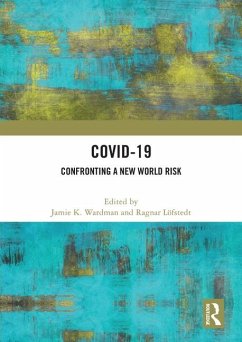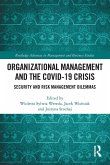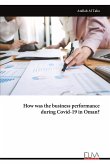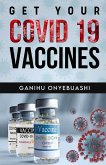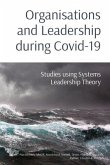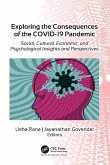COVID-19
Confronting a New World Risk
Herausgeber: Wardman, Jamie K.; Löfstedt, Ragnar
COVID-19
Confronting a New World Risk
Herausgeber: Wardman, Jamie K.; Löfstedt, Ragnar
- Broschiertes Buch
- Merkliste
- Auf die Merkliste
- Bewerten Bewerten
- Teilen
- Produkt teilen
- Produkterinnerung
- Produkterinnerung
This book looks at COVID-19, along with other recent infectious disease outbreaks, with the broad aim of providing constructive lessons and critical reflections from across a wide range of perspectives and disciplinary interests within the risk analysis field. A few chapters also discuss past disease outbreaks, like Zika, Ebola and MERS-CoV.
Andere Kunden interessierten sich auch für
![Organizational Management and the COVID-19 Crisis Organizational Management and the COVID-19 Crisis]() Organizational Management and the COVID-19 Crisis63,99 €
Organizational Management and the COVID-19 Crisis63,99 €![Through the Glass: The Reality of Working at a For-Profit New York Nursing Home During the COVID-19 Pandemic Through the Glass: The Reality of Working at a For-Profit New York Nursing Home During the COVID-19 Pandemic]() Helen BeedeThrough the Glass: The Reality of Working at a For-Profit New York Nursing Home During the COVID-19 Pandemic14,99 €
Helen BeedeThrough the Glass: The Reality of Working at a For-Profit New York Nursing Home During the COVID-19 Pandemic14,99 €![How was the business performance during Covid-19 in Oman? How was the business performance during Covid-19 in Oman?]() Atallah Al TahaHow was the business performance during Covid-19 in Oman?42,99 €
Atallah Al TahaHow was the business performance during Covid-19 in Oman?42,99 €![Get Your Covid 19 Vaccines Get Your Covid 19 Vaccines]() Ganihu OnyebuashiGet Your Covid 19 Vaccines14,99 €
Ganihu OnyebuashiGet Your Covid 19 Vaccines14,99 €![Organisations and Leadership during Covid-19 Organisations and Leadership during Covid-19]() MacDonald Barnett McGillOrganisations and Leadership during Covid-1920,99 €
MacDonald Barnett McGillOrganisations and Leadership during Covid-1920,99 €![Exploring the Consequences of the COVID-19 Pandemic Exploring the Consequences of the COVID-19 Pandemic]() Exploring the Consequences of the COVID-19 Pandemic109,99 €
Exploring the Consequences of the COVID-19 Pandemic109,99 €![Integrated Model for Sound Internal Functioning and Sustainable Value Creation: A Solution for Corporate Environments: Post Covid-19 Pandemic Integrated Model for Sound Internal Functioning and Sustainable Value Creation: A Solution for Corporate Environments: Post Covid-19 Pandemic]() Magdeline RamaboeaIntegrated Model for Sound Internal Functioning and Sustainable Value Creation: A Solution for Corporate Environments: Post Covid-19 Pandemic23,99 €
Magdeline RamaboeaIntegrated Model for Sound Internal Functioning and Sustainable Value Creation: A Solution for Corporate Environments: Post Covid-19 Pandemic23,99 €-
-
-
This book looks at COVID-19, along with other recent infectious disease outbreaks, with the broad aim of providing constructive lessons and critical reflections from across a wide range of perspectives and disciplinary interests within the risk analysis field. A few chapters also discuss past disease outbreaks, like Zika, Ebola and MERS-CoV.
Hinweis: Dieser Artikel kann nur an eine deutsche Lieferadresse ausgeliefert werden.
Hinweis: Dieser Artikel kann nur an eine deutsche Lieferadresse ausgeliefert werden.
Produktdetails
- Produktdetails
- Verlag: Routledge
- Seitenzahl: 310
- Erscheinungstermin: 27. Mai 2024
- Englisch
- Abmessung: 246mm x 174mm x 17mm
- Gewicht: 555g
- ISBN-13: 9781032326764
- ISBN-10: 103232676X
- Artikelnr.: 70364836
- Herstellerkennzeichnung
- Libri GmbH
- Europaallee 1
- 36244 Bad Hersfeld
- gpsr@libri.de
- Verlag: Routledge
- Seitenzahl: 310
- Erscheinungstermin: 27. Mai 2024
- Englisch
- Abmessung: 246mm x 174mm x 17mm
- Gewicht: 555g
- ISBN-13: 9781032326764
- ISBN-10: 103232676X
- Artikelnr.: 70364836
- Herstellerkennzeichnung
- Libri GmbH
- Europaallee 1
- 36244 Bad Hersfeld
- gpsr@libri.de
Jamie Wardman is Assistant Professor of Risk Management at Nottingham University Business School, UK. His research is primarily focussed on the sociology of risk and the theory and practice of risk communication as this relates to such issues as organisational operations, science and technology controversies, emergency preparedness, crisis response, public policy, and health and safety. He is particularly interested in how sociocultural perspectives on risk and its representation can help inform risk management policy design, operations and evaluation. Ragnar E. Löfstedt is Professor of Risk Management and the Director of King's Centre for Risk Management, UK, where he teaches and conducts research on risk communication and management. Ragnar has conducted research in risk communication and management in such areas as renewable energy policy, transboundary environmental issues (acid rain and nuclear power), health and safety, telecommunications, biosafety, pharmaceuticals, and the siting of the building of incinerators, fuel policy, nuclear waste installations and railways.
Introduction - COVID- 19: confronting a new world risk 1. COVID- 19:
reflections on trust, tradeoffs, and preparedness 2. The COVID- 19
pandemic: how can risk science help? 3. Does the COVID- 19 pandemic refute
probability neglect? 4. COVID- 19 infection and death rates: the need to
incorporate causal explanations for the data and avoid bias in testing 5.
Bayesian network analysis of Covid- 19 data reveals higher infection
prevalence rates and lower fatality rates than widely reported 6.
Resilience in the face of uncertainty: early lessons from the COVID- 19
pandemic 7. Backing up emergency teams in healthcare and law enforcement
organizations: strategies to socialize newcomers in the time of COVID- 19
8. Comparative risk science for the coronavirus pandemic 9. Predictors of
expressing and receiving information on social networking sites during
MERS- CoV outbreak in South Korea 10. Public health emergency response
coordination: putting the plan into practice 11. Outbreak! Socio- cognitive
motivators of risk information sharing during the 2018 South Korean MERS-
CoV epidemic 12. Risk communication in a double public health crisis: the
case of Ebola and cholera in Ghana 13. From information to intervention:
connecting risk communication to individual health behavior and community-
level health interventions during the 2016 Zika outbreak 14. Risk
perceptions of COVID- 19 around the world 15. Mismanagement of Covid- 19:
lessons learned from Italy 16. The paradox of trust: perceived risk and
public compliance during the COVID- 19 pandemic in Singapore 17. Managing
the Covid- 19 pandemic through individual responsibility: the consequences
of a world risk society and enhanced ethopolitics 18. Be alarmed. Some
reflections about the COVID- 19 risk communication in Germany 19. Did the
world overlook the media's early warning of COVID- 19? 20. Fact- checking
as risk communication: the multi- layered risk of misinformation in times
of COVID- 19 21. Pandemic democracy: elections and COVID- 19 22. Survival
at the expense of the weakest? Managing modern slavery risks in supply
chains during COVID- 19 23. COVID- 19 risk governance: drivers, responses
and lessons to be learned 24. 'A monstrous threat': how a state of
exception turns into a 'new normal' 25. Recalibrating pandemic risk
leadership: thirteen crisis ready strategies for COVID- 19
reflections on trust, tradeoffs, and preparedness 2. The COVID- 19
pandemic: how can risk science help? 3. Does the COVID- 19 pandemic refute
probability neglect? 4. COVID- 19 infection and death rates: the need to
incorporate causal explanations for the data and avoid bias in testing 5.
Bayesian network analysis of Covid- 19 data reveals higher infection
prevalence rates and lower fatality rates than widely reported 6.
Resilience in the face of uncertainty: early lessons from the COVID- 19
pandemic 7. Backing up emergency teams in healthcare and law enforcement
organizations: strategies to socialize newcomers in the time of COVID- 19
8. Comparative risk science for the coronavirus pandemic 9. Predictors of
expressing and receiving information on social networking sites during
MERS- CoV outbreak in South Korea 10. Public health emergency response
coordination: putting the plan into practice 11. Outbreak! Socio- cognitive
motivators of risk information sharing during the 2018 South Korean MERS-
CoV epidemic 12. Risk communication in a double public health crisis: the
case of Ebola and cholera in Ghana 13. From information to intervention:
connecting risk communication to individual health behavior and community-
level health interventions during the 2016 Zika outbreak 14. Risk
perceptions of COVID- 19 around the world 15. Mismanagement of Covid- 19:
lessons learned from Italy 16. The paradox of trust: perceived risk and
public compliance during the COVID- 19 pandemic in Singapore 17. Managing
the Covid- 19 pandemic through individual responsibility: the consequences
of a world risk society and enhanced ethopolitics 18. Be alarmed. Some
reflections about the COVID- 19 risk communication in Germany 19. Did the
world overlook the media's early warning of COVID- 19? 20. Fact- checking
as risk communication: the multi- layered risk of misinformation in times
of COVID- 19 21. Pandemic democracy: elections and COVID- 19 22. Survival
at the expense of the weakest? Managing modern slavery risks in supply
chains during COVID- 19 23. COVID- 19 risk governance: drivers, responses
and lessons to be learned 24. 'A monstrous threat': how a state of
exception turns into a 'new normal' 25. Recalibrating pandemic risk
leadership: thirteen crisis ready strategies for COVID- 19
Introduction - COVID- 19: confronting a new world risk 1. COVID- 19:
reflections on trust, tradeoffs, and preparedness 2. The COVID- 19
pandemic: how can risk science help? 3. Does the COVID- 19 pandemic refute
probability neglect? 4. COVID- 19 infection and death rates: the need to
incorporate causal explanations for the data and avoid bias in testing 5.
Bayesian network analysis of Covid- 19 data reveals higher infection
prevalence rates and lower fatality rates than widely reported 6.
Resilience in the face of uncertainty: early lessons from the COVID- 19
pandemic 7. Backing up emergency teams in healthcare and law enforcement
organizations: strategies to socialize newcomers in the time of COVID- 19
8. Comparative risk science for the coronavirus pandemic 9. Predictors of
expressing and receiving information on social networking sites during
MERS- CoV outbreak in South Korea 10. Public health emergency response
coordination: putting the plan into practice 11. Outbreak! Socio- cognitive
motivators of risk information sharing during the 2018 South Korean MERS-
CoV epidemic 12. Risk communication in a double public health crisis: the
case of Ebola and cholera in Ghana 13. From information to intervention:
connecting risk communication to individual health behavior and community-
level health interventions during the 2016 Zika outbreak 14. Risk
perceptions of COVID- 19 around the world 15. Mismanagement of Covid- 19:
lessons learned from Italy 16. The paradox of trust: perceived risk and
public compliance during the COVID- 19 pandemic in Singapore 17. Managing
the Covid- 19 pandemic through individual responsibility: the consequences
of a world risk society and enhanced ethopolitics 18. Be alarmed. Some
reflections about the COVID- 19 risk communication in Germany 19. Did the
world overlook the media's early warning of COVID- 19? 20. Fact- checking
as risk communication: the multi- layered risk of misinformation in times
of COVID- 19 21. Pandemic democracy: elections and COVID- 19 22. Survival
at the expense of the weakest? Managing modern slavery risks in supply
chains during COVID- 19 23. COVID- 19 risk governance: drivers, responses
and lessons to be learned 24. 'A monstrous threat': how a state of
exception turns into a 'new normal' 25. Recalibrating pandemic risk
leadership: thirteen crisis ready strategies for COVID- 19
reflections on trust, tradeoffs, and preparedness 2. The COVID- 19
pandemic: how can risk science help? 3. Does the COVID- 19 pandemic refute
probability neglect? 4. COVID- 19 infection and death rates: the need to
incorporate causal explanations for the data and avoid bias in testing 5.
Bayesian network analysis of Covid- 19 data reveals higher infection
prevalence rates and lower fatality rates than widely reported 6.
Resilience in the face of uncertainty: early lessons from the COVID- 19
pandemic 7. Backing up emergency teams in healthcare and law enforcement
organizations: strategies to socialize newcomers in the time of COVID- 19
8. Comparative risk science for the coronavirus pandemic 9. Predictors of
expressing and receiving information on social networking sites during
MERS- CoV outbreak in South Korea 10. Public health emergency response
coordination: putting the plan into practice 11. Outbreak! Socio- cognitive
motivators of risk information sharing during the 2018 South Korean MERS-
CoV epidemic 12. Risk communication in a double public health crisis: the
case of Ebola and cholera in Ghana 13. From information to intervention:
connecting risk communication to individual health behavior and community-
level health interventions during the 2016 Zika outbreak 14. Risk
perceptions of COVID- 19 around the world 15. Mismanagement of Covid- 19:
lessons learned from Italy 16. The paradox of trust: perceived risk and
public compliance during the COVID- 19 pandemic in Singapore 17. Managing
the Covid- 19 pandemic through individual responsibility: the consequences
of a world risk society and enhanced ethopolitics 18. Be alarmed. Some
reflections about the COVID- 19 risk communication in Germany 19. Did the
world overlook the media's early warning of COVID- 19? 20. Fact- checking
as risk communication: the multi- layered risk of misinformation in times
of COVID- 19 21. Pandemic democracy: elections and COVID- 19 22. Survival
at the expense of the weakest? Managing modern slavery risks in supply
chains during COVID- 19 23. COVID- 19 risk governance: drivers, responses
and lessons to be learned 24. 'A monstrous threat': how a state of
exception turns into a 'new normal' 25. Recalibrating pandemic risk
leadership: thirteen crisis ready strategies for COVID- 19

